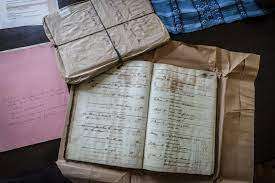Cape Verde slavery artifact nominated for UNESCO's Memory of the World Register

The president of the National Archives Institute of Cape Verde, José Maria Borges has presented a book of slaves freed in 1856 to be nominated this month for UNESCO's International Memory of the World Register.
The book constitutes a segment of the four boxes of protected documentation at the archive's headquarters, in Praia.
José Maria Borges explained: “Since slavery was formally abolished in 1878, we believe that these will be the last official records of slaves in the country.”
According to Asemana online, the weathered pages, bearing marks indicative of the passage of time, showcase handwritten tables in ink that remain entirely readable. Alongside the lengthier names of the owners, referred to as "lords," are the listings of their corresponding slaves, typically recorded with one or two names.
Marianne, from Brava Island, Ginvefa, from Bissau, José Correa, from Fogo Island, each meticulously detailed, including estimated age, ethnic markings, hair and eye color. Basically, information intended to aid their masters in identifying them.
The collection encompasses 12 of these books and 72 individual sheets of documents pertaining to the establishment, constitution, and operations of the Mixed Luso-British Commission for the abolition of slavery. This commission, initiated in 1842 on Boavista Island, was formed with the objective of curbing the trafficking of enslaved individuals, said Asemana online.
Maria Borges added: “Cape Verde, due to its geographical situation”, which positions itself in the middle of the Atlantic, “was confronted with pirate ships.” As a result, the British and Portuguese crowns established a collaborative force that may have been an “embryonic form of maritime surveillance” that exists today.
Among the records associated with this commission are guidelines and details regarding the seizure of vessels, the adjudication of intercepted cases, particulars on the liberation of slaves, and “instructions for navy ships that carried out control”.
The nominated documentation is sourced from the documentary collection of the General Secretariat of the Cape Verdean Government, recognized as the most frequently consulted in the archive.
The UNESCO application required a year of preparation, carried out under the auspices of the National Commission for the Memory of the World, of which the National Archive is a part. The commission is also finalizing the nomination of writings by Amílcar Cabral, proposed by the foundation bearing his name, a key figure in the independence movements of Guinea-Bissau and Cape Verde.